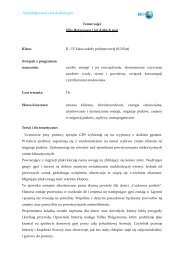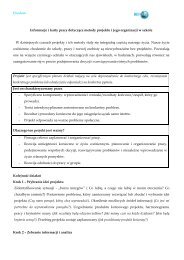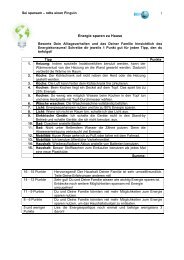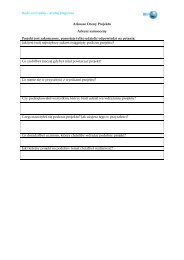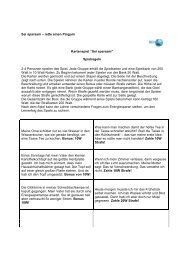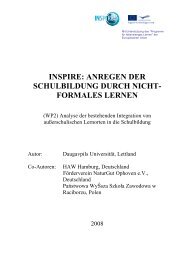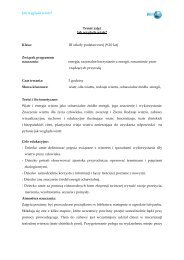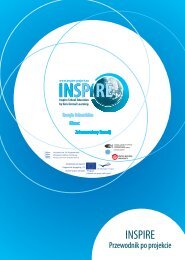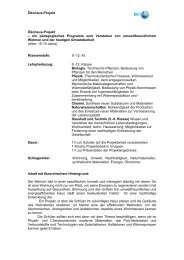INSPIRE WP2 results Latvia.pdf - The INSPIRE project
INSPIRE WP2 results Latvia.pdf - The INSPIRE project
INSPIRE WP2 results Latvia.pdf - The INSPIRE project
You also want an ePaper? Increase the reach of your titles
YUMPU automatically turns print PDFs into web optimized ePapers that Google loves.
<strong>INSPIRE</strong><br />
COMENIUS PROJECT MEETING in<br />
LATVIA<br />
<strong>INSPIRE</strong> SCHOOL EDUCATION BY NON-FORMAL<br />
LEARNING<br />
17-18 June, 2008
REPORT ON SITUATION IN LATVIA<br />
(<strong>WP2</strong>)<br />
Anita Pipere
Overview<br />
1. National documents and national research<br />
2. Structure of national non-formal education<br />
3. Analysis of <strong>results</strong> from experts interviews and teacher surveys<br />
in relation to integration of formal/non-formal education and<br />
energy topic in non-formal education<br />
4. Best practice examples<br />
5. Short overview of collected out-of-school places<br />
6. What is the meaning and practical applicability of these <strong>results</strong><br />
for the further development of <strong>INSPIRE</strong> <strong>project</strong>?
National documents and national research<br />
o<br />
NATIONAL ENERGY POLICY<br />
o <strong>The</strong> Baltic Energy Strategy (2006a) outlines a framework for the energy<br />
sector development in long-term perspective taking into consideration<br />
aspects of energy efficiency, energy security, sustainability and<br />
improved management.<br />
o Guidelines for Development of Energy Sector for 2007-2016 (EM,<br />
2006b) include the governmental policy, development targets and<br />
priorities in the energy sector both in the medium term and long term.<br />
o Energy policy is transposed in the National Development Plan<br />
(strategic planning document for years 2007 – 2013) and in the <strong>Latvia</strong>n<br />
Sustainable Development Strategy (CM, 2002).<br />
o National Lisbon Programme of <strong>Latvia</strong> for 2005-2008 (EM, 2006c) <strong>Latvia</strong><br />
strives to improve security of energy supply and diversify energy<br />
sources, thereby reducing dependence of EU member states from one<br />
energy supplier.
National documents and national research<br />
DOCUMENTS AND PROJECTS ON ENERGY TOPIC IN NON-<br />
FORMAL EDUCATION<br />
• SCORE programme (1997-2000) - to create self-supporting<br />
structures in Central Europe that support improvements in<br />
energy efficiency in end-use energy sectors. In cooperation with<br />
Local Government Training Centre of <strong>Latvia</strong> (LGTC) a training<br />
course and manuals have been developed on municipal energy<br />
efficiency policy planning, energy efficiency communication and<br />
public relations and energy efficiency <strong>project</strong> development.<br />
• <strong>Latvia</strong>n NGO’s in the environmental, energy and social field have<br />
set up several local <strong>project</strong>s on energy efficiency.
National documents and national research<br />
RESEARCH ON ENERGY TOPIC<br />
• <strong>Latvia</strong>n Journal of Physics and Technical Sciences (published by the<br />
Institute t of Physical Energetics of <strong>Latvia</strong>n Academy of Science)<br />
• Major problems that have been researched are the following:<br />
· design of new technologies of energy production and<br />
improvement of the existing ones;<br />
· energy security, energy production and consumption costs;<br />
·raising i energy efficiency, i diminishing i i thermal energy losses in<br />
the private sector;<br />
· alternative types of energy and searching for environmentally<br />
friendly ways of energy production and use for<br />
transport needs.
National documents and national research<br />
RESEARCH ON NON-FORMAL EDUCATION<br />
• Mārīte Kravale-Pauliņa - Doctoral <strong>The</strong>sis in Pedagogy “Youth nonformal<br />
education in <strong>Latvia</strong>” in 2006 (DU)<br />
• Master <strong>The</strong>sis defended at DU:<br />
Jānis Lūkins Analysis of Vital Capacity of Little HEPS<br />
Nadežda Semjonova Process of Organising Leisure Activities for Children and<br />
Youth in Daugavpils<br />
Agnese Stārka Non-Formal Education in Youth Support Centres<br />
Edvīns Šincāns Development Perspectives of Joint-Stock Company<br />
‘Latvenergo’ , Provision of Necessary Capital Investments and Competitiveness<br />
Potential in EU Market<br />
Aivars Pudāns Waste Management Perspectives in South Latgale Region in<br />
2005-2025<br />
2025<br />
Andrejs Kostjugovs Management of Material Resources in the East<br />
Network Branch of Joint-Stock Company ‘Latvenergo’<br />
Electric
Structure of national non-formal education<br />
NON-FORMAL YOUTH EDUCATION
Structure of national non-formal education<br />
DEVELOPMENT OF NON-FORMAL EDUCATION IN LATVIA:<br />
1. Supplement of formal education (supervision of Ministry of<br />
Education and Science);<br />
2. Process of developing unavailable formal knowledge and skills<br />
(supervision of Ministry of Education and Science, and Ministry of<br />
Children and Family Affairs);<br />
3. New knowledge, skills, competences that are needed in process of<br />
changes (any institution, organization that have capacity in this<br />
problem solving).
Structure of national non-formal education<br />
Government Society Private sector<br />
∗ Ministry:<br />
1. Ministry of Economics; http://www.em.gov.lv/<br />
2. Ministry of Education and Science;<br />
http://www.izm.gov.lv/<br />
3. Ministry of Environment; http://www.vidm.gov.lv/<br />
4. Ministry of Agriculture; http://www.zm.gov.lv/<br />
5. Ministry of Regional Development and Localgovernments;<br />
http://www.raplm.gov.lv<br />
6. Ministry of Foreign Affairs; http://www.am.gov.lv<br />
7. Ministry of Children and Family Affairs<br />
www.bm.gov.lv/eng<br />
∗ Local governments<br />
∗ Educational institutions (comprehensive schools,<br />
vocational, higher education):<br />
Higher education institutions:<br />
1. Rezekne Higher School: http://www.ru.lv<br />
2. Riga Technical University; http://www.ief.rtu.lv/lv/<br />
3. Daugavpils University www.du.lv<br />
∗ <strong>The</strong> State Stock Company “<strong>Latvia</strong>’s State<br />
Forests”; http://www.lvm.lv<br />
∗<br />
Park, national parks, reservations, zoo,<br />
museums<br />
∗ Library.<br />
NGO<br />
Clubs, associations, movements<br />
foundations and forum<br />
1. Environmental Protection Club<br />
(VAK); www.vak.lv/<br />
2. <strong>The</strong> Forest Research Station (FRS)<br />
http://www.mps.gov.lv<br />
3. Baltic Environmental Forum (BEF);<br />
http://www.bef.lv/<br />
4. <strong>Latvia</strong>n Environmental Protection<br />
Fund; www.lvafa.gov.lv/<br />
5. Regional Environmental Center<br />
<strong>Latvia</strong> (REC <strong>Latvia</strong>);<br />
http://www.reclatvija.lv/<br />
6. <strong>Latvia</strong>n Green Movement;<br />
http://www.zalie.lv/<br />
7. Children’s Environmental School<br />
http://www.bvs.parks.lv<br />
∗ Voluntary associations (community,<br />
environmental friends)<br />
∗<br />
Associations - Association of<br />
Environmental Educators<br />
http://www.vi.lv/<br />
∗ Church<br />
∗ Mass media<br />
Employers:<br />
Tourism<br />
Manufacturing<br />
Agriculture<br />
Processing<br />
Construction<br />
Commerce<br />
Service<br />
Traffic<br />
Education
Analysis of <strong>results</strong> from experts interviews<br />
and teacher surveys<br />
RESEARCH METHODS AND SAMPLE<br />
Interview: with 20 experts (TT institutions – 5, teachers – 8, out-of-school places (OP) –<br />
7)<br />
Survey: with 50 teachers (majority from Latgale region of <strong>Latvia</strong>)<br />
Average age 41.8 years, SD=9.06<br />
Pedagogical experience: 17.77 years on average, SD=8 8.93<br />
25 teachers with Science background, 25 teachers with other speciality<br />
Science as subject to teach mentioned 32 times, other disciplines – 56 times.<br />
• Primary+secondary school: 18 (36%)<br />
Primary+secondary school: 18 (36%)<br />
• Secondary school: 9 (18%)<br />
• Primary school (grades 5-9): 8 (16%)<br />
• Elementary school (grades 1-4): 6 (12%)<br />
• Other schools: 5 (10%)<br />
• Elemenary+primary school: 2 (4%)<br />
• Elementary+ primary+secondary school: 2 (4%)
Analysis of <strong>results</strong> from experts interviews<br />
and teacher surveys<br />
SITUATION WITH INTEGRATION OF FORMAL AND NON-FORMAL<br />
EDUCATION<br />
UNDERSTANDING OF ISSUE<br />
Three groups of experts see the interaction of formal and informal learning<br />
differently, beginning from complementary relationships to the fully<br />
independent certified learning in out-of-school places. Teachers and TT see<br />
more problems with integration than representatives of out-of-school of places.<br />
All mention the connection with real life, and enhancement of students’<br />
knowledge, skills and attitudes in case if they are motivated to learn.<br />
Half of teachers define the integration in terms of place where nonformal<br />
education takes place – one fifth of them see it as hobby education<br />
and clubs at schools, smaller part of sample define it through the<br />
attendance of some places out-of-school of school. Second part of teachers define<br />
this integration through the deeper and more practical acquisition of school<br />
topics, special pedagogy of non-formal education and collaboration with<br />
experts.
Analysis of <strong>results</strong> from experts interviews<br />
and teacher surveys<br />
NEEDS AND GAPS<br />
Majority of experts (n=16) have participated in the integration of formal and<br />
non-formal education different in content and forms: majority of them are<br />
camps, <strong>project</strong>s, excursions, attendance of museums, and different hobby<br />
groups that is special feature of <strong>Latvia</strong>. None of mentioned out-of-school<br />
places could be regarded as specially created places solely for educational<br />
purposes. Teachers attend most frequently such out-of-schoolof places as<br />
libraries, interest centers and sport/art/music schools. Higher education<br />
institutions, science centers, zoo/botanic gardens have been attended quite<br />
rarely. Majority of teachers would like to attend such places more often.<br />
Teachers mostly coordinate the visit some days before it that shows that<br />
there could be lack of long term strategic planning for the whole year. <strong>The</strong><br />
good sign is a recognition by part of respondents that it is possible to reach<br />
a compromise. Unfortunately, only small part of respondents meet the outof-school<br />
personnel before the visits.
Analysis of <strong>results</strong> from experts interviews<br />
and teacher surveys<br />
NEEDS AND GAPS<br />
37 teachers mentioned places with whom they have a close cooperation. From them, 11<br />
places could be connected with Science and environmental issues: DU, Latgale Zoo,<br />
Rīga Zoo, Water Purification Station, Regional Environmental Administration, terrarium,<br />
Riga Sh School of Natural Studies, Leimaņi i Forestry, Botanical garden, Nature Museum,<br />
Statoil. Formally topics connected with real life are included in curriculum, however their<br />
implementation is problematic because of axiological issues, wrong approach to material,<br />
limitation only to some disciplines, lack of proper materials.<br />
<strong>The</strong> main problems were much alike for all groups and they are:<br />
• State: legislation/system, research, hypercentralization, financing;<br />
• Teachers: relevant pre-service/in-service training, motivation, time, teaching materials<br />
and aids, cooperation with out-of-school places;<br />
• Students: motivation, time;<br />
• Out-of-school places: scarsity of places, equipment, training for educational personel,<br />
teaching materials, motivation, coordination of offer with students’ needs and curriculum,<br />
leadership, self-advertisement, cooperation with schools;<br />
• Community: interest and motivation of parents.
Analysis of <strong>results</strong> from experts interviews<br />
and teacher surveys<br />
TEACHING MATERIALS<br />
TT institutions are not involved in the integration of non-formal learning and<br />
they could not name any specific materials. Teachers and OP named rather<br />
similar types of materials. <strong>The</strong> scope of materials included both hard-paper<br />
p<br />
materials (books, brochures, posters) and electronic media (CDs,<br />
video, movies). <strong>The</strong> problems mentioned were: adaptation of materials to<br />
local context, curriculum and students’ age, scientific and technical<br />
relevance of materials. Available teaching materials mainly do not include<br />
students’ social (socially pragmatic) competences, knowledge on Science,<br />
responsibility toward environment.<br />
Accessibility of teaching materials was evaluated in the middle in the list of 12<br />
factors necessary for implementation of integration of formal and non-formal<br />
education. Teachers see the teaching materials as the least important<br />
determinant (!) for the topics mastered in out-of-school places. <strong>The</strong> initiative<br />
of teacher is the main factor that determine what topic will be mastered.
Analysis of <strong>results</strong> from experts interviews<br />
and teacher surveys<br />
SITUATION WITH ENERGY TOPIC IN NON-FORMAL EDUCATION<br />
TEACHING MATERIALS FOR ENERGY TOPIC<br />
Majority think that it is enough materials for environmental education. However, only two<br />
items were mentioned in regard of energy topic. <strong>The</strong> teachers mentioned more<br />
detailed list of materials. All groups think that these materials can be used both for<br />
formal and non-formal education.<br />
While representatives of TT both admitted that were there are lot of teaching materials on<br />
energy for out-of-school well as criticising their quality, teachers and OP staff<br />
exposed their wish to have more materials and named different materials both in<br />
hard-paper and electronic form. Teachers want more updated technological approach<br />
to such materials. Teachers were rather detailed and precize on the content and<br />
pedagogy of such materials. Only one OP staff member mentioned materials that she<br />
wanted in relation to energy topic.
Analysis of <strong>results</strong> from experts interviews<br />
and teacher surveys<br />
TEACHING MATERIALS FOR ENERGY TOPIC<br />
In respect to the content of such materials they replied that such materials should:<br />
• Be complemented with methodological instructions for teachers and syllaby;<br />
• Include in comprehensive list of materials;<br />
• Contain interesting facts, correct info, proper references to other sources;<br />
• Be relevant to students’ age;<br />
• Encourage students to know more about the topic;<br />
• Be not too complex, in simple language, with illustrations;<br />
• Be complemented with worksheets;<br />
• Contain tasks asking pupils to show their personal attitude toward the topic;<br />
• Trigger the further discussion about the topic or solution of problem;<br />
• Show how to deal with issues;<br />
• Reflect all the system and processes holistically and also the place of each element<br />
• Reflect all the system and processes holistically and also the place of each element<br />
and process in the system.
Analysis of <strong>results</strong> from experts interviews<br />
and teacher surveys<br />
PREPAREDNESS TO TEACH FOR ENERGY TOPIC<br />
While teachers were somehow little more optimistic speaking of their own<br />
preparedness to work with energy topic, teacher trainers and out-of-school<br />
experts did not see the situation as good as teachers. Teachers suggested<br />
many ideas how to improve this situation. It was admitted that in order to<br />
organize learning of energy topic teachers themselves need strong scientific<br />
background, out-of-school places need proper equipment and time,<br />
teachers need to be prepared p for this topic by visiting out-of-school places<br />
connected with energy education themselves.
Analysis of <strong>results</strong> from experts interviews<br />
and teacher surveys<br />
OUT-OF-SCHOOL PLACES FOR ENERGY TOPIC<br />
Teachers were able to mention the larger number of out-of-school places for students to<br />
get an experience in understanding of real life urgencies, dealing with current<br />
problems. <strong>The</strong> universities, iti probably bl would be able to provide morescientific info<br />
about the topic. None of them, except of universities, are educational centers created<br />
specially for energy topic. <strong>The</strong>re could be forecasted some administrative problems<br />
with the visits to some of mentioned places since they usually do not see education<br />
as one of their functions.<br />
From 121 topic carried out in OP by 50 respondents only 5 topics were connected<br />
with energy. However, from 17 topics that created the most noticeable changes in<br />
pupils 13 topics were connected with nature and environmental protection. Ranking<br />
11 topics that pupils could master in out-of-school places considering their<br />
importance for pupils, two topics connected with energy had 7 and 9 rank. Topic<br />
“Environmental research and monitoring” received the second rank that is rather<br />
good sign considering that surveyed teachers teach social and humanitarian subjects<br />
two times more than Science subjects. Topic about regional history is easily acquired<br />
in museums that were the most often mentioned out-of-school place (40 times). <strong>The</strong><br />
<strong>results</strong>, however, show that the topic of energy currently is not among the most<br />
popular for surveyed teachers.
Analysis of <strong>results</strong> from experts interviews<br />
and teacher surveys<br />
OUT-OF-SCHOOL PLACES FOR ENERGY TOPIC<br />
Speaking about the challenges and concerns regarding the integration of school and outof-school<br />
places specifically for the acquisition of energy related topics <strong>Latvia</strong> does<br />
not have out-of-school learning places for enery topic. Other places connected<br />
with energy have many problems and they should understand better the situation at<br />
school. Some solutions were suggested for the improvement of situation:<br />
development e e of cooperation, o find time, create teaching materials, a organize oga in-service<br />
courses.<br />
<strong>The</strong> participants were not too willing to offer some new activities for the students as to<br />
reach the versatile understanding of energy topic and development of skills for<br />
reasonable behaviour except of those that were already mentioned. TT Institutions<br />
showed larger interest in energy topic since they have all the necessary equipment<br />
and materials. HEPS is also willing to cooperate and use its possibilities for students<br />
learning and research.<br />
Actually, the lists of places that teachers already have visited and places that they would<br />
suggest to visit do not differ too much. <strong>The</strong> only educational organizations in this list<br />
were Daugavpils University and Riga Children Nature Studies School.
Best practice examples<br />
Viļāni HEPS<br />
– study excursion on renewable energy;<br />
Ķegums HEPS – study excursion;<br />
Center of Effective Energy Usage (Riga);<br />
Workshop “A-energy” in Daugavpils University;<br />
LATVENERGO competition;<br />
TEPS – excursion (production of electric power in Daugavpils);<br />
Project in cooperation with GREEN DOT on saving energy at<br />
school and home;<br />
Science Festival at Daugavpils University;<br />
Excursion to company “LATVENERGO” (Riga);<br />
Excursion to company “LATVIJAS GĀZE”; Ā
Short overview of collected out-of-school<br />
places<br />
Daugavpils University:<br />
•Energy Day during the annual Science Fair<br />
•Science town<br />
•Physics week<br />
•Support for students’ who write scientific research works<br />
Līvāni Hydroelectric Power Plant: Excursions<br />
Farm “Zālītes”: : Excursions for pupils to canola oil press<br />
Naujene Children and Youth Centre: Consultations, camps and leisure<br />
opportunities. Classes on energy for basic school and secondary school<br />
pupils<br />
Daugavpils studio “Latgale”, Kiln: possibility to learn about operation of<br />
electric and wood kilns. Excursions on the technologies of burning pottery<br />
Daugavpils Central Library: Seminars, meetings, information days<br />
Latgale Zoo: Research work, Scientific activity, Research <strong>project</strong>s, Nature<br />
protection
<strong>The</strong> meaning and practical applicability of these <strong>results</strong><br />
for the further development of <strong>INSPIRE</strong> <strong>project</strong><br />
National documents and national research<br />
<strong>Latvia</strong> as a country is involved in dealing with energy problems on the level of legislation<br />
as other EU countries. Still, the legislation for non-formal education needs to be<br />
established yet. Research on energy topic is becoming even more popular p last years.<br />
However, there is a lack of national research on non-formal learning and energy<br />
education: these topics are not in the mainstream of educational research. <strong>The</strong> <strong>INSPIRE</strong><br />
<strong>project</strong> could become a trigger for popularization of these topics and could help to stess<br />
the importance of it.<br />
Structure of national non-formal education<br />
<strong>Latvia</strong> has a traditionally established and well-organized system of interest and hobby<br />
education. However, its main targett is At Art, Music, Sport, etc. Lately, some hobby<br />
groups with environmental aims have been established. However, there are almost no<br />
places in <strong>Latvia</strong> that could be called out-of-school educational places working entirely<br />
with energy e topic or even ee withSciences ces education. Same is recognized ed by research<br />
sample. <strong>The</strong> <strong>project</strong> could try to catch and point the attention of different stakeholders<br />
to this fact.
<strong>The</strong> meaning and practical applicability of these <strong>results</strong> for the further<br />
development of <strong>INSPIRE</strong> <strong>project</strong><br />
Integration of formal/non-formal education and energy topic in non-<br />
formal education<br />
Research sample collected for the study of the proposed issues matches with the context<br />
of the problem, aims of <strong>project</strong> and peculiarities of these categories of respondents in<br />
<strong>Latvia</strong>.<br />
All respondents in general see the integration of f/n education similary that is positive<br />
feature for the <strong>project</strong>. However, national specific prevails in some answers. In<br />
general, theachers have a positive attitude to visiting OP. Though, they visit most the<br />
libraries, interest centers and sport/art/music schools that have no close<br />
relationship with energy topic that is not too popular among study sample. <strong>The</strong><br />
research has provided the explicit structure of problems that need to be dealt with in<br />
order to visit OP – it can be used well for the <strong>project</strong>. Teachers has somehow<br />
contraversial attitude to the teaching materials: complaining about the lack of them,<br />
they at the same time do not regard them highly for organizing visits to OP or study of<br />
energy topic. For the <strong>project</strong>, the suggestions created by teachers about such<br />
materials are very important as well as recognition about the features what are<br />
needed for teachers in order to teach energy topic in OP.
Thank you!<br />
Author: Anita Pipere<br />
Address: Daugavpils University, Parades 1<br />
ZIP: LV 5400<br />
City: Daugavpils<br />
Country: LATVIA<br />
Telephone: 371+29538049<br />
Email: anita.pipere@du.lv<br />
URL: http://http://www.ise-lv.eu/<br />
eu/



